初三英语语法知识复习
- 格式:pdf
- 大小:166.08 KB
- 文档页数:25
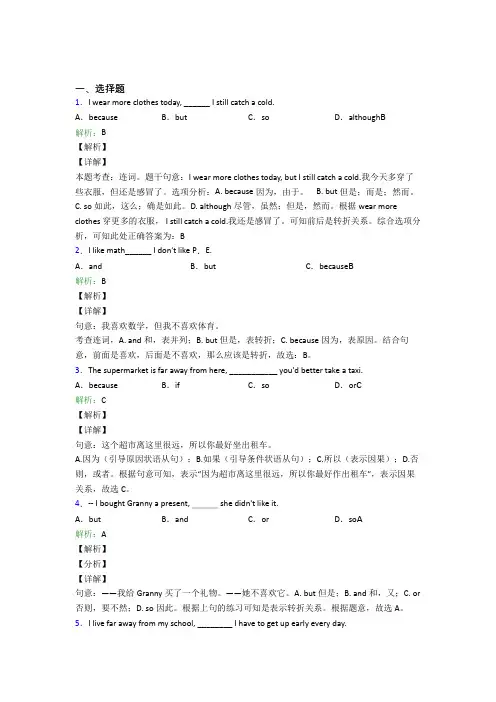
一、选择题1.I wear more clothes today, ______ I still catch a cold.A.because B.but C.so D.although B解析:B【解析】【详解】本题考查:连词。
题干句意:I wear more clothes today, but I still catch a cold.我今天多穿了些衣服,但还是感冒了。
选项分析:A. because因为,由于。
B. but但是;而是;然而。
C. so如此,这么;确是如此。
D. although尽管,虽然;但是,然而。
根据wear more clothes 穿更多的衣服, I still catch a cold.我还是感冒了。
可知前后是转折关系。
综合选项分析,可知此处正确答案为:B2.I like math______ I don't like P.E.A.and B.but C.because B解析:B【解析】【详解】句意:我喜欢数学,但我不喜欢体育。
考查连词,A. and和,表并列;B. but但是,表转折;C. because因为,表原因。
结合句意,前面是喜欢,后面是不喜欢,那么应该是转折,故选:B。
3.The supermarket is far away from here, ___________ you'd better take a taxi. A.because B.if C.so D.or C解析:C【解析】【详解】句意:这个超市离这里很远,所以你最好坐出租车。
A.因为(引导原因状语从句);B.如果(引导条件状语从句);C.所以(表示因果);D.否则,或者。
根据句意可知,表示“因为超市离这里很远,所以你最好作出租车”,表示因果关系,故选C。
4.-- I bought Granny a present, ___ she didn't like it.A.but B.and C.or D.so A解析:A【解析】【分析】【详解】句意:——我给Granny买了一个礼物。
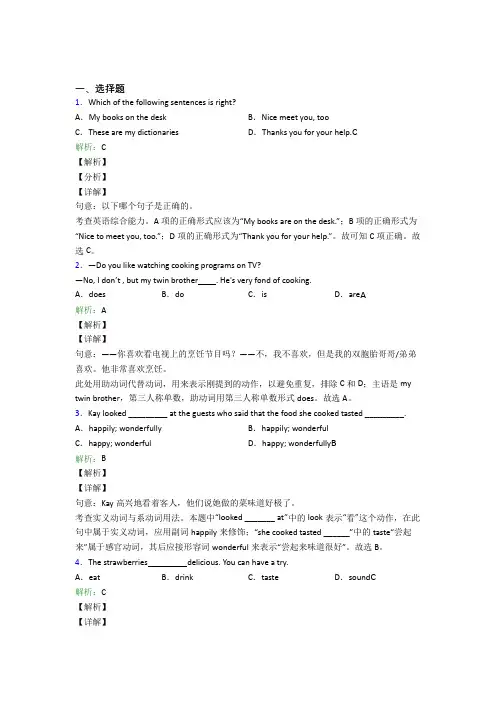
一、选择题1.Which of the following sentences is right?A.My books on the desk B.Nice meet you, tooC.These are my dictionaries D.Thanks you for your help.C解析:C【解析】【分析】【详解】句意:以下哪个句子是正确的。
考查英语综合能力。
A项的正确形式应该为“My books are on the desk.”;B项的正确形式为“Nice to meet you, too.”;D项的正确形式为“Thank you for your help.”。
故可知C项正确。
故选C。
2.—Do you like watching cooking programs on TV?—No, I don’t , but my twin brother . He's very fond of cooking.A.does B.do C.is D.are A解析:A【解析】【详解】句意:——你喜欢看电视上的烹饪节目吗?——不,我不喜欢,但是我的双胞胎哥哥/弟弟喜欢。
他非常喜欢烹饪。
此处用助动词代替动词,用来表示刚提到的动作,以避免重复,排除C和D;主语是my twin brother,第三人称单数,助动词用第三人称单数形式does。
故选A。
3.Kay looked _________ at the guests who said that the food she cooked tasted _________. A.happily; wonderfully B.happily; wonderfulC.happy; wonderful D.happy; wonderfully B解析:B【解析】【详解】句意:Kay高兴地看着客人,他们说她做的菜味道好极了。
考查实义动词与系动词用法。
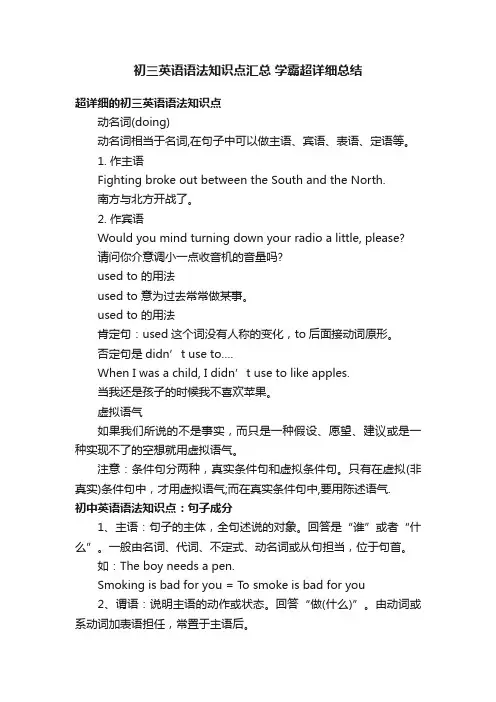
初三英语语法知识点汇总学霸超详细总结超详细的初三英语语法知识点动名词(doing)动名词相当于名词,在句子中可以做主语、宾语、表语、定语等。
1. 作主语Fighting broke out between the South and the North.南方与北方开战了。
2. 作宾语Would you mind turning down your radio a little, please?请问你介意调小一点收音机的音量吗?used to 的用法used to 意为过去常常做某事。
used to 的用法肯定句:used这个词没有人称的变化,to后面接动词原形。
否定句是didn’t use to….When I was a child, I didn’t use to like apples.当我还是孩子的时候我不喜欢苹果。
虚拟语气如果我们所说的不是事实,而只是一种假设、愿望、建议或是一种实现不了的空想就用虚拟语气。
注意:条件句分两种,真实条件句和虚拟条件句。
只有在虚拟(非真实)条件句中,才用虚拟语气;而在真实条件句中,要用陈述语气.初中英语语法知识点:句子成分1、主语:句子的主体,全句述说的对象。
回答是“谁”或者“什么”。
一般由名词、代词、不定式、动名词或从句担当,位于句首。
如:The boy needs a pen.Smoking is bad for you = To smoke is bad for you2、谓语:说明主语的动作或状态。
回答“做(什么)”。
由动词或系动词加表语担任,常置于主语后。
如:The train leaves at 6 o’clock.She is reading.3、宾语:表示动作的对象。
回答做的是“什么”。
一般由名词或代词担当,常置于谓语后。
如:He won the game.4、表语:用以表述主语的特征、状态、身份等。
回答是“什么”或者“怎么样”。
一般由名词或形容词担任,置于系动词或be动词之后。
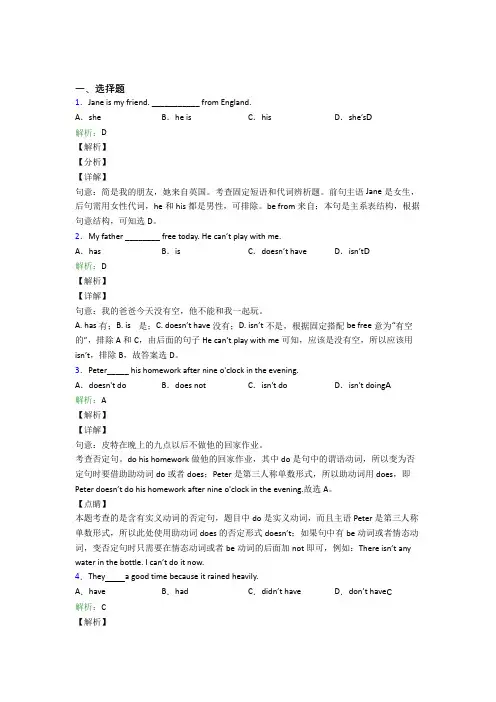
一、选择题1.Jane is my friend. ___________ from England.A.she B.he is C.his D.she’s D解析:D【解析】【分析】【详解】句意:简是我的朋友,她来自英国。
考查固定短语和代词辨析题。
前句主语Jane是女生,后句需用女性代词,he和his都是男性,可排除。
be from来自;本句是主系表结构,根据句意结构,可知选D。
2.My father ________ free today. He can’t play with me.A.has B.is C.doesn’t have D.isn’t D解析:D【解析】【详解】句意:我的爸爸今天没有空,他不能和我一起玩。
A. has有;B. is 是;C. doesn’t have没有;D. isn’t不是,根据固定搭配be free意为“有空的”,排除A和C,由后面的句子He can’t play with me可知,应该是没有空,所以应该用isn’t,排除B,故答案选D。
3.Peter_____ his homework after nine o'clock in the evening.A.doesn't do B.does not C.isn't do D.isn't doing A解析:A【解析】【详解】句意:皮特在晚上的九点以后不做他的回家作业。
考查否定句。
do his homework做他的回家作业,其中do是句中的谓语动词,所以变为否定句时要借助助动词do或者does;Peter是第三人称单数形式,所以助动词用does,即Peter doesn’t do his homework after nine o'clock in the evening.故选A。
【点睛】本题考查的是含有实义动词的否定句,题目中do是实义动词,而且主语Peter是第三人称单数形式,所以此处使用助动词does的否定形式doesn’t;如果句中有be动词或者情态动词,变否定句时只需要在情态动词或者be动词的后面加not即可,例如:There isn’t any water in the bottle. I can’t do it now.4.They a good time because it rained heavily.A.have B.had C.didn’t have D.don’t have C解析:C【解析】试题分析:句意:他们玩得不开心因为雨下得很大。
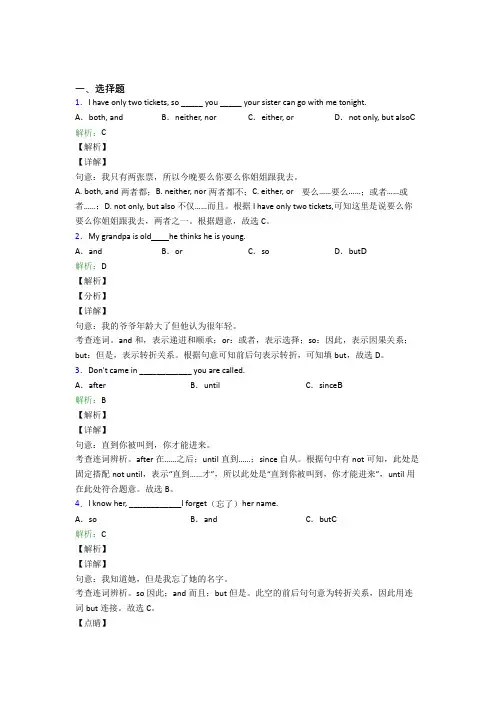
一、选择题1.I have only two tickets, so _____ you _____ your sister can go with me tonight. A.both, and B.neither, nor C.either, or D.not only, but also C 解析:C【解析】【详解】句意:我只有两张票,所以今晚要么你要么你姐姐跟我去。
A. both, and两者都;B. neither, nor两者都不;C. either, or 要么……要么……;或者……或者……;D. not only, but also不仅……而且。
根据I have only two tickets,可知这里是说要么你要么你姐姐跟我去,两者之一。
根据题意,故选C。
2.My grandpa is old he thinks he is young.A.and B.or C.so D.but D解析:D【解析】【分析】【详解】句意:我的爷爷年龄大了但他认为很年轻。
考查连词。
and和,表示递进和顺承;or:或者,表示选择;so:因此,表示因果关系;but:但是,表示转折关系。
根据句意可知前后句表示转折,可知填but,故选D。
3.Don't came in ____________ you are called.A.after B.until C.since B解析:B【解析】【详解】句意:直到你被叫到,你才能进来。
考查连词辨析。
after在……之后;until直到……;since自从。
根据句中有not可知,此处是固定搭配not until,表示“直到……才”,所以此处是“直到你被叫到,你才能进来”,until用在此处符合题意。
故选B。
4.I know her, ____________I forget(忘了)her name.A.so B.and C.but C解析:C【解析】【详解】句意:我知道她,但是我忘了她的名字。
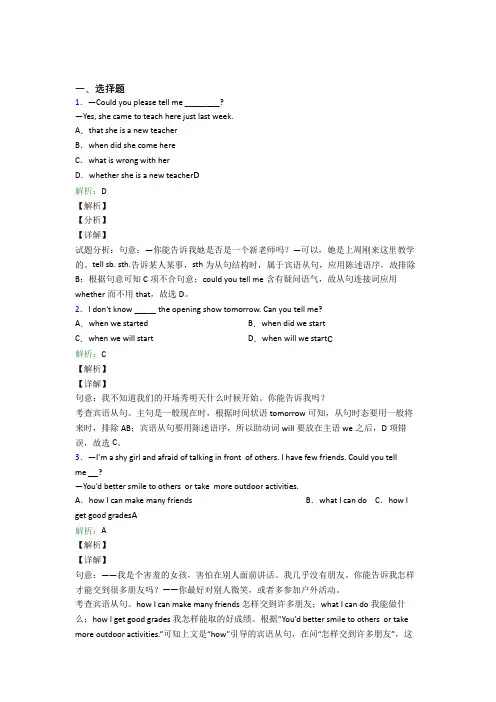
一、选择题1.—Could you please tell me ________?—Yes, she came to teach here just last week.A.that she is a new teacherB.when did she come hereC.what is wrong with herD.whether she is a new teacher D解析:D【解析】【分析】【详解】试题分析:句意:—你能告诉我她是否是一个新老师吗?—可以,她是上周刚来这里教学的。
tell sb. sth.告诉某人某事,sth为从句结构时,属于宾语从句,应用陈述语序,故排除B;根据句意可知C项不合句意;could you tell me含有疑问语气,故从句连接词应用whether而不用that,故选D。
2.I don't know _____ the opening show tomorrow. Can you tell me?A.when we started B.when did we startC.when we will start D.when will we start C解析:C【解析】【详解】句意:我不知道我们的开场秀明天什么时候开始。
你能告诉我吗?考查宾语从句。
主句是一般现在时,根据时间状语tomorrow可知,从句时态要用一般将来时,排除AB;宾语从句要用陈述语序,所以助动词will要放在主语we之后,D项错误,故选C。
3.—I’m a shy girl and afraid of talking in front of others. I have few friends. Could you tellme ?—You’d better smile to others or take more outdoor activities.A.how I can make many friends B.what I can do C.how I get good grades A解析:A【解析】【详解】句意:——我是个害羞的女孩,害怕在别人面前讲话。
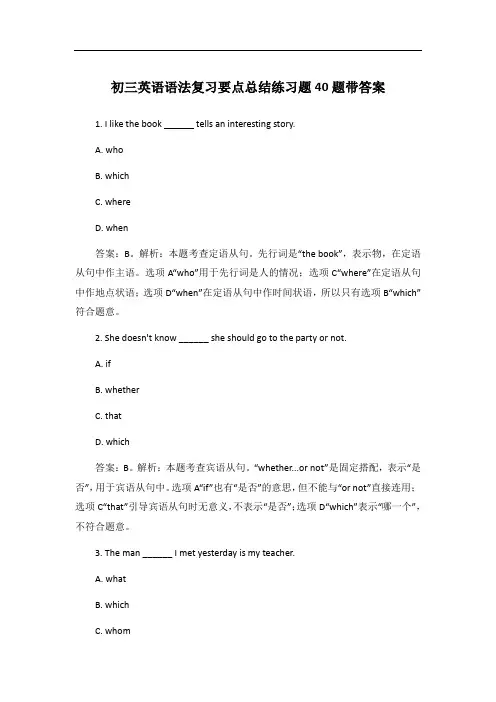
初三英语语法复习要点总结练习题40题带答案1. I like the book ______ tells an interesting story.A. whoB. whichC. whereD. when答案:B。
解析:本题考查定语从句。
先行词是“the book”,表示物,在定语从句中作主语。
选项A“who”用于先行词是人的情况;选项C“where”在定语从句中作地点状语;选项D“when”在定语从句中作时间状语,所以只有选项B“which”符合题意。
2. She doesn't know ______ she should go to the party or not.A. ifB. whetherC. thatD. which答案:B。
解析:本题考查宾语从句。
“whether...or not”是固定搭配,表示“是否”,用于宾语从句中。
选项A“if”也有“是否”的意思,但不能与“or not”直接连用;选项C“that”引导宾语从句时无意义,不表示“是否”;选项D“which”表示“哪一个”,不符合题意。
3. The man ______ I met yesterday is my teacher.A. whatB. whichC. whom答案:C。
解析:本题考查定语从句。
先行词是“the man”,在定语从句中作宾语,“met”是及物动词,后面接宾语。
选项A“what”不能引导定语从句;选项B“which”用于先行词是物的情况;选项D“whose”表示所属关系,在句中作定语,所以选项C“whom”符合题意。
4. Do you know ______ he will come back?A. whenB. whatC. whichD. where答案:A。
解析:本题考查宾语从句。
根据句子意思“你知道他什么时候回来吗”,需要一个表示时间的连接词。
选项A“when”表示时间;选项B“what”表示“什么”;选项C“which”表示“哪一个”;选项D“where”表示“哪里”,所以选项A正确。
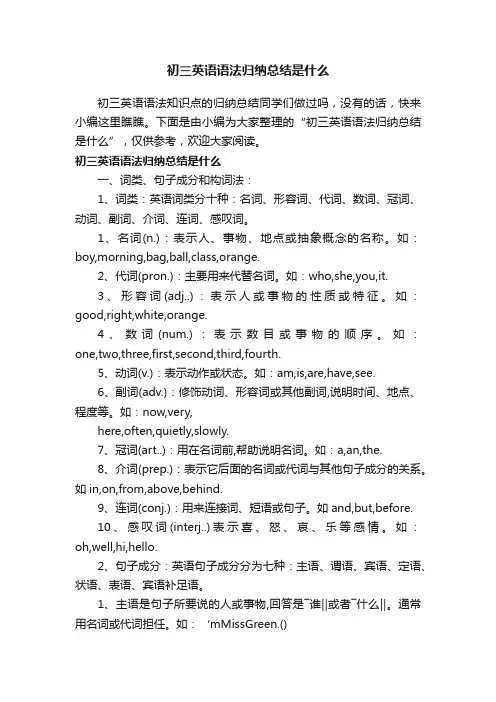
初三英语语法归纳总结是什么初三英语语法知识点的归纳总结同学们做过吗,没有的话,快来小编这里瞧瞧。
下面是由小编为大家整理的“初三英语语法归纳总结是什么”,仅供参考,欢迎大家阅读。
初三英语语法归纳总结是什么一、词类、句子成分和构词法:1、词类:英语词类分十种:名词、形容词、代词、数词、冠词、动词、副词、介词、连词、感叹词。
1、名词(n.):表示人、事物、地点或抽象概念的名称。
如:boy,morning,bag,ball,class,orange.2、代词(pron.):主要用来代替名词。
如:who,she,you,it.3、形容词(adj..):表示人或事物的性质或特征。
如:good,right,white,orange.4、数词(num.):表示数目或事物的顺序。
如:one,two,three,first,second,third,fourth.5、动词(v.):表示动作或状态。
如:am,is,are,have,see.6、副词(adv.):修饰动词、形容词或其他副词,说明时间、地点、程度等。
如:now,very,here,often,quietly,slowly.7、冠词(art..):用在名词前,帮助说明名词。
如:a,an,the.8、介词(prep.):表示它后面的名词或代词与其他句子成分的关系。
如in,on,from,above,behind.9、连词(conj.):用来连接词、短语或句子。
如and,but,before.10、感叹词(interj..)表示喜、怒、哀、乐等感情。
如:oh,well,hi,hello.2、句子成分:英语句子成分分为七种:主语、谓语、宾语、定语、状语、表语、宾语补足语。
1、主语是句子所要说的人或事物,回答是―谁‖或者―什么‖。
通常用名词或代词担任。
如:‘mMissGreen.()2、谓语动词说明主语的动作或状态,回答―做(什么)‖。
主要由动词担任。
如:Jacktheroomeveryday.()3、表语在系动词之后,说明主语的身份或特征,回答是―什么‖或者―怎么样‖。
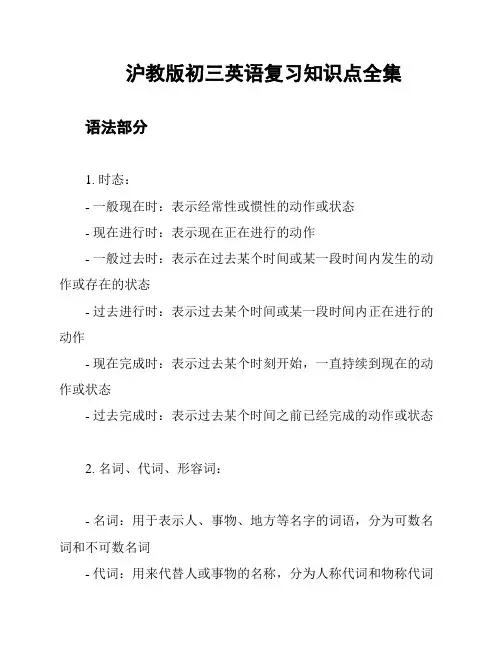
沪教版初三英语复习知识点全集语法部分
1. 时态:
- 一般现在时:表示经常性或惯性的动作或状态
- 现在进行时:表示现在正在进行的动作
- 一般过去时:表示在过去某个时间或某一段时间内发生的动作或存在的状态
- 过去进行时:表示过去某个时间或某一段时间内正在进行的动作
- 现在完成时:表示过去某个时刻开始,一直持续到现在的动作或状态
- 过去完成时:表示过去某个时间之前已经完成的动作或状态
2. 名词、代词、形容词:
- 名词:用于表示人、事物、地方等名字的词语,分为可数名词和不可数名词
- 代词:用来代替人或事物的名称,分为人称代词和物称代词
- 形容词:用量词修饰的词语,用于给人或物加以描述
3. 副词、介词、连词:
- 副词:用来修饰动词、形容词等词语,表示时间、地点、程度、方式等
- 介词:用来表达方位、时间、动作、比较、原因等含义
- 连词:用来连接并列分句、并列词组等
阅读部分
1. 阅读技巧:快速寻找主题句,了解段落大意,找到重点词汇,理解词汇的上下文含义。
2. 阅读题型:
- 主旨大意题:考查对段落大意的理解
- 细节理解题:考查对细节信息的理解
- 推理判断题:考查对文章的推理能力
- 下文内容预测题:考查对文章描写情节的把握程度
写作部分
1. 写作技巧:连贯、清晰、有条理,使用句型和词汇丰富的表达方式。
2. 写作题型:
- 书信类:包括感谢信、邀请函、建议信等
- 日记类:包括情感、书信、报道等
- 作文类:包括议论文、说明文、描述文等
以上是初三英语复习的所有知识点,复习过程中要有针对性,结合自己的不足,进行针对性复习。
祝您复习顺利!。
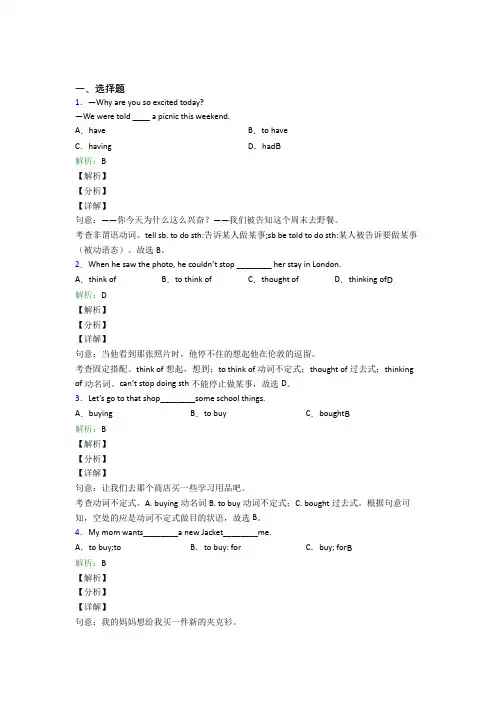
一、选择题1.—Why are you so excited today?—We were told ____ a picnic this weekend.A.have B.to haveC.having D.had B解析:B【解析】【分析】【详解】句意:——你今天为什么这么兴奋?——我们被告知这个周末去野餐。
考查非谓语动词。
tell sb. to do sth:告诉某人做某事;sb be told to do sth:某人被告诉要做某事(被动语态)。
故选B。
2.When he saw the photo, he couldn’t stop ________ her stay in London.A.think of B.to think of C.thought of D.thinking of D解析:D【解析】【分析】【详解】句意:当他看到那张照片时,他停不住的想起他在伦敦的逗留。
考查固定搭配。
think of想起,想到;to think of动词不定式;thought of过去式;thinking of动名词。
can’t stop doing sth不能停止做某事,故选D。
3.Let’s go to that shop________some school things.A.buying B.to buy C.bought B解析:B【解析】【分析】【详解】句意:让我们去那个商店买一些学习用品吧。
考查动词不定式。
A. buying动名词B. to buy动词不定式;C. bought过去式。
根据句意可知,空处的应是动词不定式做目的状语,故选B。
4.My mom wants________a new Jacket________me.A.to buy;to B.to buy: for C.buy; for B解析:B【解析】【分析】【详解】句意:我的妈妈想给我买一件新的夹克衫。
考查动词不定式以及动词接双宾语结构。
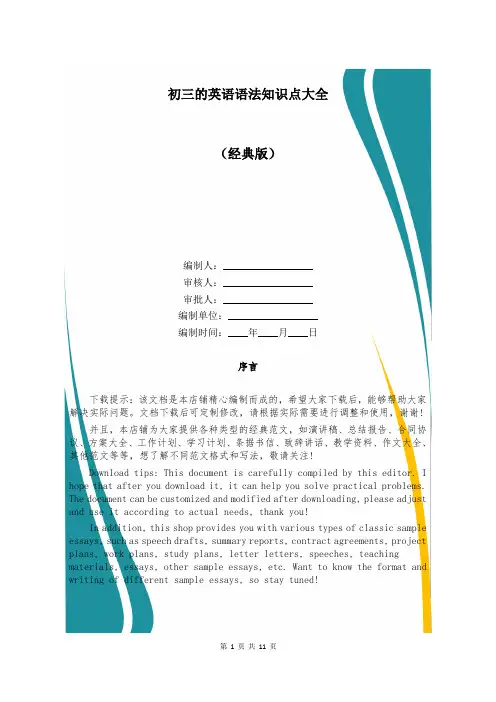
初三的英语语法知识点大全(经典版)编制人:__________________审核人:__________________审批人:__________________编制单位:__________________编制时间:____年____月____日序言下载提示:该文档是本店铺精心编制而成的,希望大家下载后,能够帮助大家解决实际问题。
文档下载后可定制修改,请根据实际需要进行调整和使用,谢谢!并且,本店铺为大家提供各种类型的经典范文,如演讲稿、总结报告、合同协议、方案大全、工作计划、学习计划、条据书信、致辞讲话、教学资料、作文大全、其他范文等等,想了解不同范文格式和写法,敬请关注!Download tips: This document is carefully compiled by this editor. I hope that after you download it, it can help you solve practical problems. The document can be customized and modified after downloading, please adjust and use it according to actual needs, thank you!In addition, this shop provides you with various types of classic sample essays, such as speech drafts, summary reports, contract agreements, project plans, work plans, study plans, letter letters, speeches, teaching materials, essays, other sample essays, etc. Want to know the format and writing of different sample essays, so stay tuned!初三的英语语法知识点大全许多英语学习者在实践中积累了丰富的经验,探讨了很多有效的方法。
一、选择题1.—Hey, Jack. Do you want to go to the library? —That ________ great. I love reading. A.hears B.looks C.sounds D.listens C解析:C【解析】【分析】【详解】句意:——嘿,杰克。
你想去图书馆么?——听起来不错。
我喜欢阅读。
考查动词的辨析。
hears听见;looks看起来;sounds听起来;listens听。
根据“great”判断回答是对前面“Do you want to go to the library”去图书馆这一建议的评价,用系动词sounds 表达“听起来不错”。
故选C。
2.These chicken wings taste ________. I want more.A.well B.wonderfully C.nice D.bad C解析:C【解析】【详解】句意:这些鸡翅尝起来不错。
我想要更多。
考查感官动词的用法及形容词辨析。
well好,副词;wonderfully精彩地;nice好的;bad 坏的。
taste是感官系动词,其后接形容词作表语,排除AB;根据题干中“I want more.”可知鸡翅尝起来很好,排除D。
故选C。
3.The strawberries delicious. You can have a try.A.eat B.drink C.taste D.sound C解析:C【解析】【详解】句意:草莓味道鲜美。
你可以尝一尝。
选项 A 的意思是吃,B 是喝,C 是尝起来,D 是听起来。
题目中的主语是 strawberries(草莓),delicious(美味的)是形容词,只有选项 C 和D 这两个感官动词后可以跟形容词,再加上句意的理解:草莓尝起来是美味的。
所以答案选 C。
4.The woman made her husband_______ outside the gate yesterday afternoon.A.wait B.waiting C.to wait D.waited A解析:A【解析】【详解】句意:昨天下午那个女人让她的丈夫在门外等待。
初三英语语法知识点初三英语语法知识点梳理1. “主语 + 谓语”(即“主谓”句型)这一句型英汉语言结构形式完全相同,说明“某人或某物如何动作”,或者说“某人或某物自身怎样运动”。
例:They arrived in Harbin yesterday morning.分析:“他们”(主语)“到了”(谓语动作)。
The earth turns around the sun.地球围绕太阳转。
The sun rises in the east, and sets in the west.太阳东升西落。
2. “主语 + 谓语 + 宾语”(即“主谓宾”句型)这一句型英汉语言的结构形式完全相同,用以说明“某人或某物做什么事情”,或者说“某人或某物发出了动作,并且其动作涉及到另一个人或物”。
例:I study English.分析:“我”(主语)“学习”(谓语动作)“英语”(宾语即动作涉及的对象)。
I like swimming.我喜欢游泳。
3. “主语 + 谓语 + 间接宾语 + 直接宾语”(即“主谓双宾”句型)这一句型英汉语序结构相同,说明“某人为谁(间接宾语为人)做某事”,或者说“某人或物的运动涉及到两个对象,其中一个间接对象为人,另一个为物”。
例:Our teacher taught us English.分析:“我们的老师”(主语)“教”(谓语动作)“我们”(间接宾语)“英语”(直接宾语)。
4. “主语 + 谓语 + 宾语 + 宾语补足语”(即“主谓宾补”句型)这一句型说明“某人或某物要求(使、让)某人做什么”或“某人感觉某人或物怎么样”。
例: He asked her to go there.分析:“他”(主语)“要求”(谓语动作)“她”(宾语即动作涉及的对象)“去那里”(补语—补充说明宾语应做什么)。
5. “主语 + have + 宾语”(即“拥有”句型)这一句型主要用于说明“某人或某物拥有什么(宾语,即有形或无形的资源)”。
初三英语必背知识点归纳总结英语作为一门重要的学科,在中学阶段占据着非常重要的地位。
初三是学习英语的关键时期,也是准备中考的重要阶段。
为了帮助初三学生复习,以下是初三英语必背的知识点的归纳总结。
一、语法知识点1. 时态和语态- 一般现在时:表示经常性的动作、习惯或真理等;- 一般过去时:表示过去某个时间发生的动作或状态;- 现在进行时:表示现在正在进行的动作;- 过去进行时:表示过去某个时间正在进行的动作;- 一般将来时:表示将来某个时间会发生的动作;- 一般过去将来时:表示过去某个时间本应发生但未实现的动作;- 被动语态:将动作的承受者放在主语位置,强调动作的承受者而非执行者。
2. 名词- 可数名词与不可数名词的区别;- 单数名词与复数名词的相互转换;- 名词所有格的用法。
3. 代词- 人称代词、物主代词、反身代词的用法;- 指示代词和疑问代词的用法。
4. 形容词和副词- 形容词和副词的基本用法;- 比较级和最高级的构成方式;- 不规则比较级和最高级的形式;- 形容词和副词的修饰范围。
5. 介词和介词短语- 常见的介词及其用法;- 介词短语在句子中的作用。
6. 动词- 不同类型动词的用法,包括实义动词、系动词、情态动词等; - 动词的时态和语态。
7. 数词和量词- 基数词和序数词的用法;- 量词的用法。
8. 并列连词和从属连词- 并列连词的分类和用法;- 从属连词的分类和用法。
9. 特殊句型- 倒装句的形式和用法;- 感叹句的形式和用法;- 条件句和虚拟语气的用法;- 宾语从句和主语从句的用法;- 直接引语和间接引语的转换。
二、词汇知识点1. 同义词和反义词- 同义词:指意义相同或相近的词语;- 反义词:指意义相反的词语。
2. 高频词汇- 常见的高频词汇,包括常用动词、形容词、副词、名词等; - 常用短语和固定搭配。
三、阅读技巧1. 阅读理解题- 不同类型的阅读题目,包括事实细节、主旨大意、推理判断等; - 阅读题目的解题技巧和答题方法。
外研版初中英语中考语法总复习专题(提优版)一、选择题1.—It's time for school. Why not get on the bus?—Linda hasn't come yet. I ___________for her.A.have waited B.am waiting C.was waiting D.waited 2.—Where is mum?—She________in the kitchen.A.cooks B.is cooking C.will cook D.cooked3.I must leave now. My brother ________ for me outside.A.waits B.waited C.is waiting D.was waiting 4.Listen! The boy ________ the piano again.A.plays B.played C.will play D.is playing 5.— Tom, where is your little sister?— She _______ in the backyard now.A.is playing B.will play C.played D.plays 6.—Hi, Daming. What are you up to?—I ________ a project about family history.A.do B.did C.am doing D.was doing 7.—May I speak to Mr. Brown?—I am sorry. He _______ an important meeting in his office at the moment.A.has B.had C.is having D.will have 8.Now ABC Cinema on Forest Road ________ the old film called Roman Holiday.A.is show B.is showing C.is showed D.is on 9.—What’s that noise, Mike?—My little sister ________ with her toy car now.A.plays B.played C.will play D.is playing 10.Listen! Someone __________ in the next room.A.sings B.sang C.was singing D.is singing 11.The zoo keeper is worried because the number of visitors ________ smaller and smaller. A.become B.are becoming C.is becoming D.have become 12.—Yesterday I received a letter from Mr.An.—You did? I hear he________for America next year.A.has left B.leaves C.left D.is leaving 13.—Hurry up!—One moment. I ________ my e-mails.A.reading B.am reading C.was reading D.have read 14.—I _____to Beijing tomorrow.—Have a good trip!A.flies B.fly C.am flying D.flew 15.—Mom, it’s so late. Why don’t you go to bed?—Your brother hasn’t come back yet. I ________ for him.A.wait B.am waiting C.has waited D.waited 16.—Mary, let's go to the cinema. There’s a new movie called Avengers IV.—Not now, I _____________ my brother David with his math.A.help B.helped C.am helping D.have helped 17.—Where is Frank?—He _________ to music in his room.A.listens B.is listening C.listened D.was listening 18.—Hey! You nearly hit the tree! What’s up?— Sorry, I ________ the trip to my hometown.A.think about B.am thinking about C.was thinking about D.thought about 19.It dark. Shall I turn on the light?A.gets B.got C.is getting D.was getting 20.— Where are the officers?— Look! They ________ the elephant in the palace now.A.touched B.will touch C.touch D.are touching 21.—Dad, I can’t work out this math problem. Can you give me a hand?— Wait a moment. I ________ on the phone.A.am talking B.will talk C.was talking D.have talked 22.You’d better not go this way. The workers _________ the road.A.have repaired B.are repairing C.repaired D.will repair 23.—What is your mother doing, Linda?—She ________ dinner in the kitchen now.A.is cooking B.was cooking C.cooks D.cooking 24.—Where is your mother, Kitty?—She ________ dinner in the kitchen.A.cooks B.cooked C.is cooking D.will cook 25.—Lily, where is our father now? Go and get him for lunch.—Just a moment, please. Father ________ a phone call in his room.A.is making B.was making C.makes D.has made 26.I can’t hear you. I ______ to an English speech.A.am listening B.listen C.was listening 27.Xifeng Street is closed today because workers _______ some repairs.A.make B.made C.are making D.were making 28.—Tina, let’s go out for shopping.—Sorry, Amy. I __________ my homework.A.do B.am doing C.did29.—Where is your father, Lily?—He ________ in the kitchen.A.cooked B.cooks C.will cook D.is cooking30.— Tina, the TV show has already been on. Come and watch together.— Wait a moment. I ________ coffee in the kitchen.A.am making B.have made C.make D.made31.The students in our group ________ the final preparation for the match. We are sure to win. A.made B.are making C.make D.will make 32.—Tom, what’s your sist er doing?— She ________ her homework in the study.A.does B.will do C.did D.is doing 33.Many children in South Sudan ________ the trouble of hunger at the moment.A.face B.faces C.is facing D.are facing 34.Be quiet! The students ________ an English exam.A.take B.are taking C.took D.have made 35.— Ruby, can you help do the dishes?— Just a moment, Mom. I ________ the flowers.A.water B.am watering C.watered D.have watered 36.—Tom, where is your father?—He ________ my bike.A.is repairing B.repairs C.has repaired D.will repair 37.—John, how was your interview on Monday?—No idea. I for the result. I was told it would come in two days.A.wait B.waited C.will wait D.am waiting 38.Betty can’t join us in the card game. She ________ the classroom.A.has cleaned B.was cleaning C.has cleaned D.is cleaning 39.—Can Peter play games with us, Mrs. Hawking?—Wait a minute. He ________ a shower.A.is taking B.taken C.took D.was taking 40.Be quiet. Your brother ________ classes online.A.has B.is having C.will have D.had【参考答案】一、选择题1.B【详解】句意:——该上学了。
九年级英语语法知识点汇总
一、名词
1.可数名词和不可数名词
2.单数形式和复数形式的变化规则
3.特殊名词的复数形式变化规则
二、代词
1.人称代词的主格和宾格形式
2.反身代词的用法及形式
3.指示代词的用法及形式
4.物主代词的用法及形式
三、动词
1.时态的用法(一般现在时、现在进行时、一般过去时、过去进行时、将来时)
2.被动语态的构成及用法
3.情态动词的用法及不同情态动词的辨析
四、形容词和副词
1.形容词的基本用法及比较级和最高级的构成
2.副词的基本用法及比较级和最高级的构成
3.形容词和副词的位置
五、介词和介词短语
1.常用介词的用法及常见短语的搭配
2.介词短语的位置和作用
六、连词和并列句
1.连词的分类和用法(并列连词、从属连词、对等连词)
2.并列句的构成及注意事项
七、从句和复合句
1.名词性从句的种类和用法(主语从句、宾语从句、表语从句)
2.定语从句的构成及引导词的使用
3.状语从句的分类及引导词的使用
八、倒装句和间接引语
1.完全倒装句和部分倒装句的构成及使用场景
2.直接引语和间接引语的转换
九、复习与补充
1.重点复习前面九个年级所学的语法知识点
2.补充其他有关九年级英语语法的知识
以上是九年级英语语法知识点的汇总,希望能帮助到你对这些知识点的理解和掌握。
在学习过程中,请多做练习和总结,以提高自己的语法能力。
祝你学习顺利!。
初三英语语法知识点集锦英语语法是针对英语语言进行研究后,英语语法系统地总结归纳出来的一系列语言规则。
下面是小编为大家精心整理的初三英语语法知识点,欢迎阅读,希望对大家有所帮助。
一、定义过去将来时常用于宾语从句或间接引语中。
过去将来时常用“would + 动词原形”或“was / were going to + 动词原形”来表达。
过去将来时的基本特征,也就是我么年今天所谈到的“立足过去,着眼未来” 。
它表示从过去某一时间来看将要发生的某个动作或存在的某种状态。
例如:Mary told me that she would go to Shanghai by plane. 玛丽告诉我说她将要坐飞机去上海。
二、用法1. 表示从过去某个时间看来将要发生的动作或存在的状态。
I didn’t know when he would go to the park.He said that he would wait for me at the school gate.此种情况常用于宾语从句或间接引语中。
用“was / were going to + 动词原形” ,“was / were about to + 动词原形”表示将来的动作或状态。
She told me she was going to fly to Yunnan.I was about to leave the house when the telephone rang.和一般将来时一样,也可用相应的其他形式表示。
2.过去进行时态有时可用来表示过去将来。
He said the train was leaving atfive the next morning. He said he was coming to see me.常见于 come, go 等瞬间动词。
(1)基本构成——A ) would + 动词原形如:He asked me if I would stay here. 他问我是否要待在这儿。
1 初三英语语法知识专题复习一、名词一、总的来说,名词分为专有名词和普通名词两类. 专有名词:用来表示某个(些)人、地方、机构等专有名称的词。如Marx、Beijing、USA等,其中的实词第一个字母要大写。如the Great Wall等。二、名词按其所表示的事物的性质分为可数名词与不可数名词。1、可数名词(个体名词和集体名词):(1)单数(前加a或an表“一”); (2)复数(词尾加“-s”或“-es”)。其规则如下:A.规则变化:(1、以s、x、sh、ch结尾的,加-es / iz /; 如boxes, glasses, watches, brushes等;(2、以“辅音字母+y”结尾的,变y为i,加-es; 如families, babies, countries等;(3以f、fe结尾的,变f、fe为v,加-es; 如knives, wives, halves等;(4、以“辅音字母+o”结尾的,加-es; 如potatoes, tomatoes等,但外来词和缩写词只能加-s,如pianos, kilo(kilogram)——kilos, photo(photograph)——photos.而zero——zeros/zeroes. (5、一般情况加-s,清辅音后发/s/,如desks, maps等,浊辅音和元音后发/z/.如apples, holidays, boys。但houses /′hauziz/, mouths/mau z/. B.不规则变化(child---children man----men woman---women policeman----policemen foot—feet tooth---teeth mouse---mice)(复数名词: people police shoes public clothes)(1、单数、复数形式相同的:sheep, deer, fish, Chinese, Japanese等。(2、表示民族、国家的名词,除Chinese, Japanese的复数不变,Englishman, Frenchman的复数变-man为-men外,其余的均在词尾加-s.如Americans, Germans, Russians, Australians (附某国、某国人、某国语言的词形联系表).→→→→→→→(3、复合名词复数的构成方法①在中心词上加-s或-es, 如:pencil-boxes.
②在第二个组成部分上加-s或-es, 如:boy-friends, tooth-brushes等. ③含性别的复合词,两部分都变为复数,如:man-teacher——men-teachers, woman-driver——women-drivers. 2、不可数名词(抽象名词和物质名词):不能以数目来计算的名词。如water, meat, rice, air, food, time, work, bread等等。它们只有单数形式,不能在前面加a(an)或数词来表示一个或几个。只能用“of词组”来表达。如“五块肉”five pieces of meat,“三袋小麦”three bags of wheat,“四则新闻”four pieces of news. 3、可数名词和不可数名词的转换:如:chicken, c“小鸡”,u“鸡肉”;fish, c“鱼”,u“鱼肉”,orange, c“橘子”,u“橙汁”,paper, c“试卷、论文”,u“纸张”,time, c“次数”,u“时间”等等。三、名词的所有格(含义“……的”)1、基本构成方法:(1)以s结尾的名词,其所有格只加“′”。如the students’ teacher the twins’ bedroom.但以s结尾的单数名词,也可在词尾加“′s”。如Ross’s bag.(2)其他情况加“’s”。如:Jane’s father,Women’s Day2、其他规则:(1)并列名词的所有格:①共同所有,只需在最后一个名词词尾加-’s,如:Kate and Joan’s room.②分别所有,则在每个名词词尾加-’s,如Kate’s and Joan’s.
(2)表示无生命的事物名词,一般用of表示所属关系。如:the map of China, the legs of the table. (3)双重所有格:①用of结构与名词所有格-’s结合构成双重所有格:a friend of my father’s, one book of his brother’s.②用of结构加名词性物主代词构成双重所有格:a pen of mine, a neighbour of his. (4)表示时间、距离、城镇、国家等的名词常用-’s形式:an hour’s walk, yesterday’ news, China’s population, twenty minutes’ walk.(5)可用-’s表示店铺、某人家:the Greens’, my uncle’s.典例()1.This is ____ news. A.such a good B.a very good C. such good ()2. _____ knowledge of space develops very quickly. A.People’s B.Man’s C.Men’s()3. The number of people invited to the party _____ fifty, but a number of them ____ absent for different reasons. A. was/were B. was /was C. were/were ()4. “Would you like ___?” “____, please.”
A. a drink/ A coffee B. drink/A cup of coffee C. a cup drink/A cup coffee ()5. Two thirds of the work ____ done. A. are B. is C. have
()6.The rich ____ not always happy. A. is B. have C. are
国家人民语言America American English England Englishman English France Frenchman French Germany German German Japan Japanese Japanese China Chinese Chinese Canada Canadian English, French 2
()7. She is the only one of the ____ writers who _____ stories for children. A. woman/writes B. women/writes C. women/write ()8. I met him at _____. A.Mr. Green’s B.the Greens C.Greens’()9.Playing football is _____. A.a great fun B.great funs C.great fun ()10.The sheep on the hill _____ theirs. They are all white. A.is B.was C.are 提高训练一、用所给名词的正确形式填空:1.My shirt is much cheaper than ________.(John) 2.The girl in red is ______________ (Tom and Kate) 3.The _________ (Brown) are watching TV now. 4.Our school is about ten __________ (minute) walk. 5.March 8 is _______________ (woman day). 6.Who won the _________ (boy) 400- _______ (meter) race? 7.This is ___________ (today) newspaper. 8.There are twenty-five _________ (man) workers in my factory. 9.I like ___________ (chicken) very much. They’re lovely. So I never eat _________ (chicken).10.Although he is a thirty- ___________ (year old) man, you can see few ________ (hair) on the head. 二、冠词一、冠词的种类:不定冠词a(an), 定冠词the。冠词不能单独使用,必须置于名词前。二、不定冠词的用法:一般用于单数名词前,表泛指。其中a用于读音以辅音开头的词前,an用于读音以元音开头的词前。如: a basketball, a university, an hour, an apple. 1、表示第一次提到的人或物。如:(1)I bought a new book. (2)He met an old woman on the way to school. 2、表示人或物的某一类。如:(1)I’m a boy. (2)Would you like an orange?3、表示数量“一”,但没有one强。如:(1)She has a pencil.(侧重pencil, 而非其他物品) (2)She has one pencil.(侧重
数量“一支”,而非“两支、三支”)
4、表示“每一”,相当于every。如:They go to see the old man once a week. 5、用于带修饰的抽象名词之前,表示“一种”。如:That’s a great surprise to her.6、指某人或某物,但不具体说明何人、何物。如:A boy is waiting for you. 7、用于固定搭配词组中。如:a lot of, a little, a piece of. 三、定冠词的用法:定冠词在单复数可数名词和不可数名词前都可使用,表特指,有“this/that或these/those”之意。1、特指某人或某物。The man under the tree is his father. 2、指上文提到过的人或物。I bought a new book yesterday. The book is very useful. 3、指说话双方都提到过的人或物。A: Where is the dirty sock, Tom? B: It’s on the bed, mum.4、表示世界上独一无二的事物。the sun, the moon, the earth. 5、用于序数词或形容词最高级前。(1)He is the tallest boy in our class. (2)The first lesson is about English name. 6、用于姓氏复数前,表“……一家人”。the Blacks, the Wangs. 7、用于单数名词前,表一类人或物。The